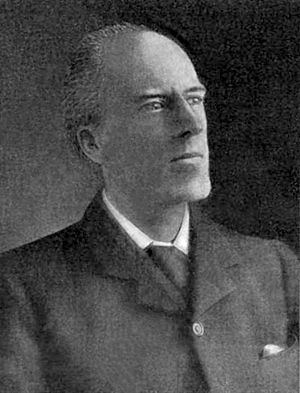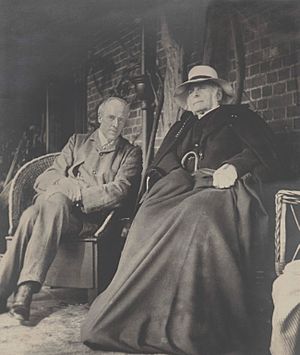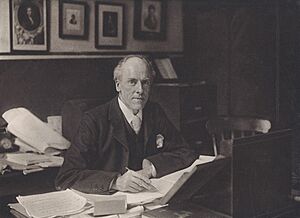Karl Pearson facts for kids
Quick facts for kids
Karl Pearson
|
|
|---|---|

Pearson in 1912
|
|
| Born |
Carl Pearson
27 March 1857 Islington, London, England
|
| Died | 27 April 1936 (aged 79) Coldharbour, Surrey, England
|
| Alma mater | |
| Known for |
|
| Awards |
|
| Scientific career | |
| Fields | Lawyer, Germanist, eugenicist, mathematician and statistician (primarily the last) |
| Institutions | |
| Academic advisors | Francis Galton |
| Notable students |
|
| Influenced | Albert Einstein, Henry Ludwell Moore, James Arthur Harris |
Karl Pearson (born Carl Pearson; 27 March 1857 – 27 April 1936) was an English mathematician and biostatistician. He is famous for creating the field of mathematical statistics. In 1911, he started the world's first university statistics department at University College, London. He also made big contributions to biometrics (using math in biology) and meteorology (the study of weather). Pearson was a supporter of social Darwinism and eugenics, which are ideas that are now widely rejected. He was a student and biographer of Sir Francis Galton.
Contents
Early Life and Learning
Pearson was born in Islington, London, into a Quaker family. His father, William Pearson, was a lawyer. Karl had two siblings, Arthur and Amy.
He went to University College School. Then, in 1876, he studied mathematics at King's College, Cambridge. He graduated in 1879. After Cambridge, he traveled to Germany. He studied physics at the University of Heidelberg and philosophy. He also visited the University of Berlin. There, he attended lectures on Darwinism. Pearson also learned about Roman Law and German literature. He became a skilled historian and expert in German culture. He spent much of the 1880s in different European cities. He wrote about plays, religion, and the writer Goethe.
Pearson was offered a job teaching German studies at King's College, Cambridge. He noticed that German students were not as athletic as those in Cambridge. He wrote to his mother, saying he now thought sports were very important.
Later, Pearson returned to London to study law, just like his father.
His Career and Work
Pearson studied law until 1881, but he never worked as a lawyer. He then went back to mathematics. He filled in for math professors at King's College, London in 1881 and at University College, London in 1883. In 1884, he became a professor of Applied Mathematics at University College, London.
In 1891, he also became a professor of Geometry at Gresham College. There, he met Walter Frank Raphael Weldon, a zoologist. Weldon had problems that needed math to solve them. They worked together on biometry (math in biology) and evolution until Weldon died in 1906. Weldon introduced Pearson to Charles Darwin's cousin, Francis Galton. Galton was interested in how traits are passed down and in eugenics. Pearson became Galton's student and admirer.
After Galton died in 1911, Pearson wrote a detailed, three-volume book about his life. It was published in 1914, 1924, and 1930. Pearson even paid for much of the printing himself. The book celebrated Galton's life and work. Pearson believed Galton would be remembered more than Charles Darwin.
When Galton died, he left money to the University of London for a special professor in Eugenics. Pearson was the first person to hold this position, called the Galton Chair of Eugenics. He created the Department of Applied Statistics. He stayed there until he retired in 1933 and kept working until he died.
Family Life
In 1890, Pearson married Maria Sharpe. They had three children: Sigrid, Helga, and Egon Pearson. Egon also became a statistician and took over his father's department. Maria died in 1928. In 1929, Karl married Margaret Victoria Child, who worked with him. He and his family lived in Hampstead, London. He died in Coldharbour, Surrey on 27 April 1936.
Einstein and Pearson's Ideas
When Albert Einstein started a study group in 1902, his first suggestion for reading was Pearson's book, The Grammar of Science. This book talked about ideas that later became part of Einstein's theories.
Pearson believed that the laws of nature depend on how an observer sees them. He thought that if someone traveled at the speed of light, they would see time stand still. He even wondered if traveling faster than light would make time go backward, like a movie played in reverse! Pearson also discussed ideas like antimatter and the fourth dimension.
Pearson's ideas about relativity were based on the idea that science is about what's in our minds. He wrote that science is "a classification and analysis of the contents of the mind." He believed that "Law in the scientific sense is thus essentially a product of the human mind."
Views on Society
Pearson was known as a strong atheist and a freethinker. He also supported socialism. He gave talks on topics like "the woman's question," which was about women's rights during the time of the suffragist movement in the UK. He even refused an award (OBE) in 1920 and a knighthood in 1935 because of his socialist beliefs.
Pearson held views related to eugenics and social Darwinism. These were ideas that aimed to "improve" human populations, but they are now seen as very harmful. He believed that some human groups were "inferior" and that war could be a way for "fitter races" to survive. He also thought that if people came from "poor stock," education and good laws wouldn't truly improve them in the long run. These ideas are not accepted today.
In 1925, Pearson opposed Jewish immigration to Britain. He claimed that these immigrants would become a "parasitic race" and were "somewhat inferior physically and mentally to the native population." These views are considered antisemitic and are widely condemned.
In June 2020, UCL announced that it was renaming two buildings that had been named after Pearson. This was because of his connection to these harmful ideas about eugenics.
Contributions to Biometrics
Karl Pearson was very important in starting the field of biometrics. This field uses math to study biology, especially how traits are passed down. His many papers, called "Mathematical Contributions to the Theory of Evolution," made him a founder of this field.
Pearson spent a lot of time developing statistical tools for biometry. These tools are still used widely today for data analysis. They include:
- The chi-squared test
- Standard deviation
- Correlation and regression coefficients
Pearson followed Francis Galton's work. He used many of Galton's ideas to develop a theory of continuous evolution, meaning changes happen gradually. Pearson and his colleague Weldon applied statistical thinking to inheritance, variation, and natural selection.
Pearson believed that laws of nature were useful for making good predictions and describing data. He thought that finding a specific biological way for traits to be passed down (like genes) was not as important as using math to describe what was observed. This led to big debates between Pearson's group (biometricians) and the Mendelians, who focused on genes. Even though the Mendelian approach became more popular, the math tools Pearson developed are still very important in biology and evolution studies today.
Contributions to Statistics
Pearson's work covered many areas where he used and developed mathematical statistics. These included biology, epidemiology (study of diseases), medicine, psychology, and history. In 1901, with Weldon and Galton, he started the journal Biometrika to develop statistical theory. He edited this journal until he died. Many women mathematicians, like Beatrice Mabel Cave-Browne-Cave and Alice Lee, helped him with his research. He also started another journal, Annals of Eugenics, in 1925.
Pearson's ideas are behind many "classical" statistical methods we use today. Here are some of his important contributions:
- Correlation coefficient: This measures how strongly two things are related.
- Method of moments: He used "moments" (a physics idea) to describe data and fit distributions.
- Pearson's system of continuous curves: A set of math curves that became the basis for many common probability distributions.
- Chi distance: A way to measure how far apart data points are.
- p-value: This helps decide if research results are meaningful.
- Foundations of statistical hypothesis testing: He helped create the ideas behind testing scientific guesses with data.
- Pearson's chi-squared test: A test used to see if observed data matches what's expected.
- Principal component analysis: A method to simplify complex data.
- Histogram: Pearson is often credited with introducing this type of bar graph, which shows how often different values appear in data.
Awards and Recognition
Pearson was recognized in many different fields. Here are some of his awards and memberships:
- 1896: Became a FRS (Fellow of the Royal Society).
- 1898: Won the Darwin Medal.
- 1911: Received honorary degrees from the University of St Andrews and University of London.
- 1920: Was offered (but refused) the OBE.
- 1932: Won the Rudolf Virchow medal.
- 1935: Was offered (but refused) a knighthood.
He was also an Honorary Fellow of King's College, Cambridge, the Royal Society of Edinburgh, University College London, and the Royal Society of Medicine. In 2007, a conference was held to celebrate 150 years since his birth.
See also
 In Spanish: Karl Pearson para niños
In Spanish: Karl Pearson para niños
 | Selma Burke |
 | Pauline Powell Burns |
 | Frederick J. Brown |
 | Robert Blackburn |



